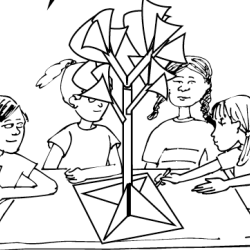Source Institutions
Source Institutions
Add to list Go to activity
Activity link broken? See if it's at the internet archive

This activity (on pages 13-18) has learners build a model tree and then figure out how to make their tree stand up by itself. This illustrates how the tall rain forest trees adapt to support a huge trunk and heavy branches, while also sending their roots out instead of down. Trees built in this activity can be used for the Rain Forest in Your Room activity that is also part of the Wonderwise Rain Forest Ecologist Activity Book.
- 30 to 45 minutes
- 1 to 2 hours
- $1 - $5 per group of students
- Ages 8 - 14
- Activity, Model
- English, Spanish
Quick Guide
Materials List (per group of students)
- masking tape
- 1 large brown grocery bag - heavy gauge
- green tissue paper cut into 10 x 6 inch pieces (four pieces per team)
- 10 x 10 inch pieces of tagboard or cardboard (1 or 2 pieces per team)
- scissors
Subjects
-
Life Sciences
-
Diversity of Life
- Plants
- Ecology
-
Diversity of Life
-
The Nature of Science
-
The Scientific Process
- Asking Questions
-
The Scientific Process
-
The Nature of Technology
-
The Design Process
- Problem Solving
-
The Design Process
Informal Categories
- Arts and Crafts
- Nature and Environment
Audience
To use this activity, learners need to:
- see
- touch
Learning styles supported:
- Involves teamwork and communication skills
- Involves hands-on or lab activities
Designed specifically for
- Rural dweller
Culture, ethnicity, and gender
-
Girls
- Explicity developed for this group
Other
Foreign language versions of this resource:
Components that are part of this resource:
Includes alignment to state and/or national standards:
This resource is part of:
Access Rights:
- Free access
By:
Source Collection
- Science After School Consumer's Guide
Rights:
- All rights reserved, University of Nebraska State Museum, 2001
Funding Sources:
- Howard Hughes Medical Institute
- National Science Foundation Informal Science Education Program, 9909496
